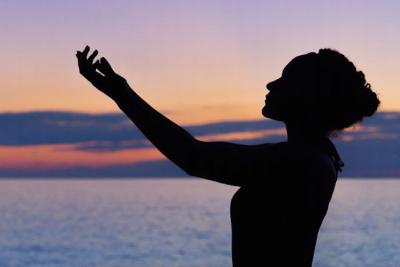

Anna Hunt, Staff Writer
Waking Times
According to the beliefs of several ancient cultures, the early morning hours may be ideal for meditation and spiritual reflection. New age and spiritual circles will also claim that if you wake between the hours of 3am and 5am, you may be going through a spiritual awakening.
Although it’s difficult to prove if any of these claims are true, I would like to share some beliefs of the Secoya tribe of Ecuador. This indigenous tribe’s way of life is entwined with its traditions and ceremonies, even today, when most of the world has become Westernized.
Spiritual Hours of Shamanic Healing Ceremonies
The shaman elders of the Secoya conduct powerful healing ceremonies using plant medicines. In their culture, they plan these gatherings during late night hours and early morning. They believe that each night, at around 3am, benevolent spirits descend upon the earth. As well, the spirits of most of the earthly creatures are finally at rest.
The shaman elders believe that the angelic spirits are compassionate. They are here to help in our journey of self-healing and preservation. It is during the hours of 3am to 6am that the shaman will sing the most effervescent icaros, medicine songs, to invite these spirits to the ceremony.
Time of Letting Go in Chinese Medicine
The Secoya are not alone. Many non-western cultures place esoteric significance on different times of the day and night. Another example is in Chinese medicine. The 12 meridians in the body rejuvenate with qi – life force or energy – during different hours. As qi cycles through the body, each organ meridian is most active for about 2 hours during a 24-hour period.
In Chinese medicine, the hours between 5am and 7am are ideal for meditation. This time is when qi cycles through the large intestine meridian, closely associated with letting go. It is the time we are best equipped (energetically, at least) to deal with issues of distress, confusion, compulsive habits, rigidity, irritability, and depression.
Morning Meditation in the Modern World
Even some modern psychologists agree. A daily morning meditation practice sets a positive tone for the entire day. Laura Maciuika, clinical psychologist and author of Conscious Calm, states:
Before breakfast is generally a good time to meditate. But for beginners, especially folks who are feeling stressed out, meditating at all can be daunting. In that case, I recommend simply putting your attention on slower, deeper breathing—even for just five minutes—early in the day before getting busy with anything.
Morning meditation can be very beneficial. Even if you don’t buy into the ancient beliefs of the Secoya and the Chinese, consider a very practical perspective: during morning hours, the mind and body are calmer. Most importantly, there are often fewer distractions.
Of course, you have to consider your life responsibilities and work and family schedules before committing to a meditation practice. I have three children, so I get that mornings can be busy. If you can only meditate at 7pm, then by all means don’t pass up the opportunity. It is better than not doing it at all.
If early morning just does not work for you, plan to sit down daily at any other time. If your schedule is completely sporadic, meditating at different times each day is fine, too.
Consider, though, that a meditation may not be as effective when you are overly-stimulated, tired or hungry. When meditating right before bedtime, the brain may think you are just winding down for sleep. The goal of meditation is to invigorate and wake up the brain – not to shut it down. Finally, try not to meditate right after eating because the body uses lots of energy to digest food.
Final Thoughts
There really is no way to know if any of the ancient beliefs or new-age claims about morning hours are true. Meditation and other spiritual practices are extremely personal. Thus, only the individual can assess if the time of day affects what they experience in meditation. Furthermore, it often takes a seasoned practitioner to notice the subtle nuances of the different approaches to spiritual and esoteric practices.
What I do know is that mounting scientific research is showing us that meditation heals. It restores the body and heals the mind. A morning meditation, even if it’s only 10 minutes, is a powerful self-care tool. And there’s a bonus: if you get it done in the morning, then you don’t have to stress out about making time for it during the rest of your day.
About the Author
Anna Hunt is writer, yoga instructor, mother of three, and lover of healthy food. She’s the founder of Awareness Junkie, an online community paving the way for better health and personal transformation. She’s also the co-editor at Waking Times, where she writes about optimal health and wellness. Anna spent 6 years in Costa Rica as a teacher of Hatha and therapeutic yoga. She now teaches at Asheville Yoga Center and is pursuing her Yoga Therapy certification. During her free time, you’ll find her on the mat or in the kitchen, creating new kid-friendly superfood recipes.
This article was originally created and published by Waking Times and is published here under a Creative Commons license with attribution to Anna Hunt and WakingTimes.com. It may be re-posted freely with proper attribution, author bio, and this copyright statement.
Disclaimer: This article is not intended to provide medical advice, diagnosis or treatment. Views expressed here do not necessarily reflect those of Waking Times or its staff.


